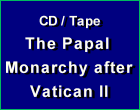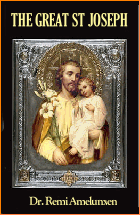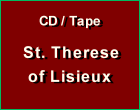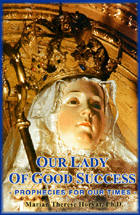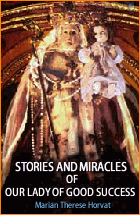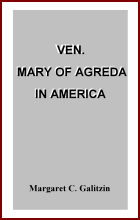Special Devotions
 |
 |
 |
 |
 |
 |
 |
Adveniat Regnum Tuum
Already in 1938, Prof. Plinio was foreseeing the days we have reached now: the explosion of Communism that ends in Satanism, the need for religious to remain faithful to their full vocations or a delay in the end of the Revolution, a crisis in the Church which was not well even then. He was also calling on lay people to fight for Holy Mother Church and pray "Adveniat regnum tuum."
Already then, he was advising us to turn in prayer at Christmas to Our Lady, who will provide the resolution to this chaos by intervening in History as she did in Roman times, when the problems – like today – were unresolvable. Then it was she who, unbeknownst to the world, brought the Savior to light to save a corrupt mankind. Today she will act again and intervene in History to end the Revolution and re-install the Reign of her Son on earth, the Reign of Jesus in Mary, with Mary and through Mary predicted at Fatima and Quito.
Already then, he was advising us to turn in prayer at Christmas to Our Lady, who will provide the resolution to this chaos by intervening in History as she did in Roman times, when the problems – like today – were unresolvable. Then it was she who, unbeknownst to the world, brought the Savior to light to save a corrupt mankind. Today she will act again and intervene in History to end the Revolution and re-install the Reign of her Son on earth, the Reign of Jesus in Mary, with Mary and through Mary predicted at Fatima and Quito.
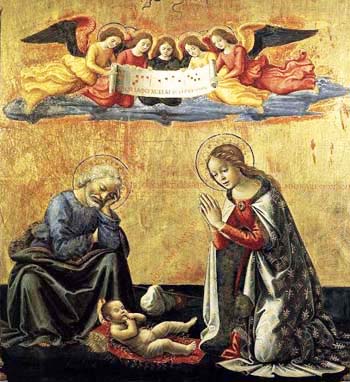
A universal sursum corda at Christmas
Our epoch is a dark valley between two end points: the civilization of the past, from which we have fallen through successive catastrophes that began with the Pseudo-Reformation and culminated in the totalitarianisms of the right and the left, and the civilization of the future, towards which we are walking through great struggles and disappointments that fill our path with crosses at every moment.
For this very reason, because we are living in the last minutes of a world that is expiring, and we can already see the precursor signs of another world that is being born, the lesson of Christmas has a profound meaning for us, upon which we should meditate today.
In a recent article, we presented a summary of the aspirations that pre-Christian mankind nourished regarding the coming of a Savior. The Chosen People awaited this salvation through a Messiah, born from the trunk of David, in accordance with the authentic and irrefutable divine promise.
All the other peoples of the earth, although they had not received the divine messages through the Prophets, conserved a reminiscence of the promise of a Savior, made by God to Adam and Eve when they left Paradise. For this reason they also maintained, sometimes more and sometimes less distorted, the traditional hope that a Savior would come to regenerate suffering and sinful humanity. This hope had reached its summit at the time when Our Lord came into the world. As a famous historian stated, all of mankind at that time felt old and worn out. The political and social formulas then in use no longer responded to the desires the people of that time and their way of seeing things. An immense desire for reform shook many peoples.
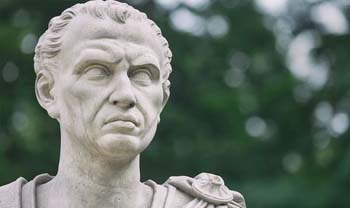
The solution for the crisis in the world came neither from a powerful Caesar nor the partying aristocrats, nor conspirators but from the prayers of a Virgin
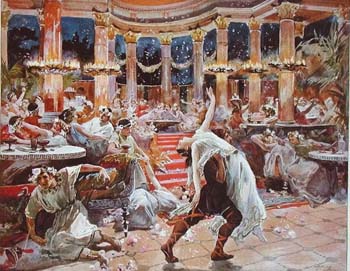
In all the countries, the contrast between wealth and poverty was patent. On the one hand, extremely rich men lived in opulence and disorderly luxury. On the other hand, a multitude of men without work infested many districts of the large cities of the time. Finally, as a dark backdrop, millions and millions of slaves, chained in the holds of ships or harnessed like animals to carts or tied like animals to the plow, groaned under the gauntlet of an oppression that seemed to have no end.
An immense corruption of customs was spreading throughout the territory of the Empire and ruining all the political institutions. Scandals multiplied in the ranks of the highest aristocracy and spread from there to every level of society. Augustus tried in vain to respond to the growing decadence. His reactionary laws had no effect. Even within his own family the most monstrous aberrations were multiplying. And everyone felt that an immense crisis threatened society with inevitable ruin.
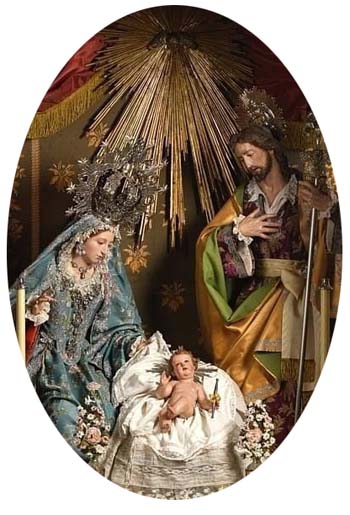
Neither one nor the other, neither the brilliant Emperor nor the sybarites who were ruining society, had any idea of what was happening at that moment in Bethlehem. However, it was not in the imperial palace, nor at the aristocratic orgies, nor in the meetings of the conspirators, that the fate of the world was decided.
The society of the future, which would arise from the perfect and complete solution to these crucial and vital problems of the time, was born in Bethlehem, and it was from the virginal hands of Mary that the world received the Messiah who would redeem mankind with His Blood and reorganize it with His Gospel.
What is the principal lesson we should learn from this?
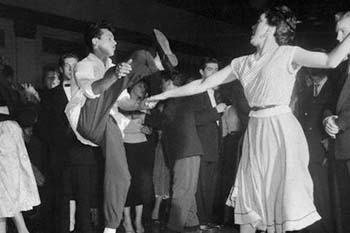
The answer will not come from the dance halls of the 1930s or from today’s priests rocking for Mary with enthused ‘nuns’ dancing along

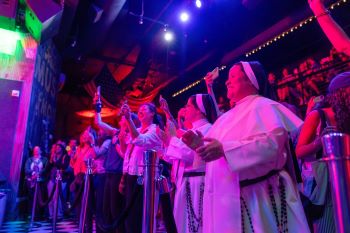
It is possible that, unconsciously imitating Augustus' vigil on Christmas Eve, many a modern-day Caesars (what a difference in expanse between the authentic Caesar and his contemporary facsimiles!) is spending Christmas Eve hunched over a work table, devising ways to pull his suffering homeland out of the quagmire of the contemporary crisis, indifferent to the piety of the masses praying in the Churches.
It is also possible that on that same night, the unbridled orgies of many palaces (no longer the palaces of the aristocracy as in ancient Rome, but the sumptuous modern "dancing halls" that the modern world erects in honor of its own corruption) shatters the silence of the night with the sound of profane New Year's Eve music. And perhaps many conspirators are plotting revolution and war in the silence of the night while the people celebrate the birth of the Prince of Peace.
Despite all this, it is not from the new Caesars, not from the conspirators of our days, and much less not from the society that is corrupted by the "dancing halls" that our salvation will come. If we are Catholics, we must expect salvation exclusively from those who represent Christ today on earth. It is to Pius XI that we must turn our eyes, and only to him in this world.
But there is another reflection of the greatest usefulness. All the theologians agree in affirming that if salvation broke upon the world at the time it did, we owe it to the omnipotent prayers of Mary Most Holy, who was the one who brought forth the day of the Messiah's birth. No one can say how many years or centuries the Redemption would have taken without the prayers of the Virgin Mary.
In the time of Augustus it was not those who demonstrated in the public squares or political councils to achieve the reorganization of the world who worked this reorganization. It came from the humble and trusting prayer of the Virgin Mary, completely ignored by her contemporaries and living a contemplative and solitary life in the small corner where Providence caused her to be born.
Without detracting in the slightest from the active life, it is important to note that it was through prayer and contemplation that the moment of Redemption was brought forward. And that the benefits that the genius of Augustus, as well as the tactics of all the great politicians, generals, financiers and administrators of his time, could not give to the world, God dispensed through the Mary Most Holy. The one who benefited the world the most was not the one who studied the most nor the one who acted the most, but the one who knew how to pray the most and the best.
If the contemporary world wants to escape the chaos in which it finds itself, it must first turn to the Church.
This brief Christmas meditation ends with a suave and austere lesson. On the human level, an anticipation or a delay in the restoration of the Social Reign of Our Lord Jesus Christ may depend above all upon the fighters of Catholic Action and the chosen souls whom God has called to the priestly or religious state to live the life of action or the life of prayer.
Aware of the grandeur of this mission, what we, the lay people who fight for the Church, must do is pray at the crib of the Baby Jesus, "Domine, adveniat regnum tuum."
"Lord, may Thy Kingdom come." May we realize this within ourselves, so that later, with Thy help, we may also realize it around us.
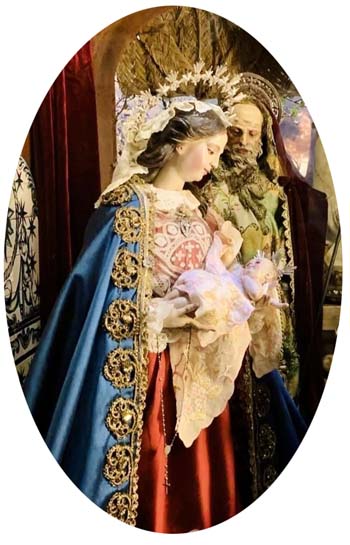

O Legionário, n. 328, December 25, 1938
Posted December 27, 2024
Posted December 27, 2024
______________________
______________________




